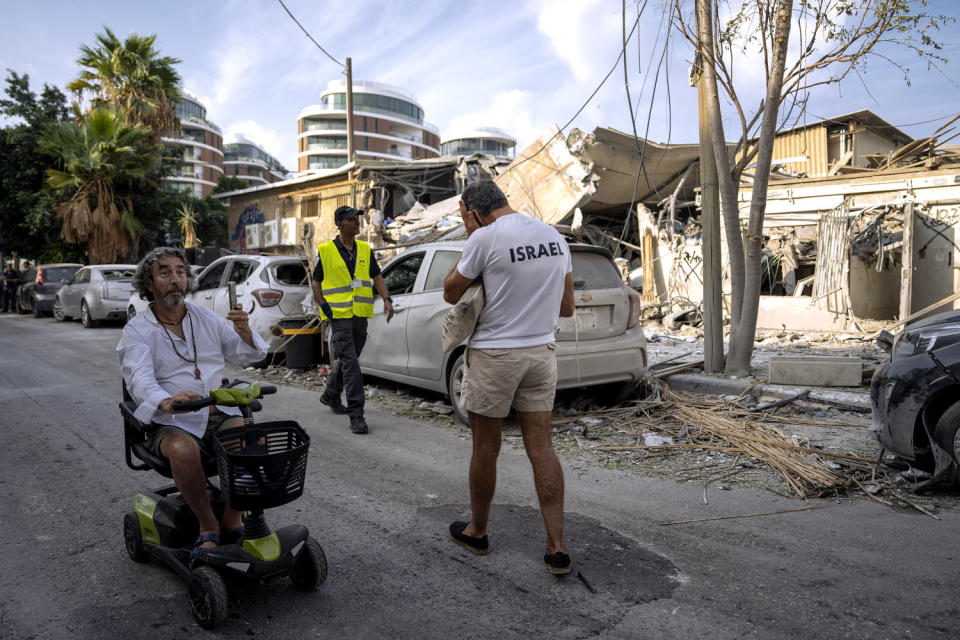Hamas attack bears hallmarks of Iranian involvement, former U.S. officials say
The unprecedented scale and the sophisticated tactics Hamas used in its attack on Israel indicate Iran most likely played a significant role in the multipronged assault, former U.S. intelligence and military officers say.
From the use of fast boats to hostage-taking to swarming an adversary, the Hamas operation displayed an approach Iran and its proxies often use against opponents with superior conventional forces, said three former senior intelligence officials and a former senior military officer.
“The sophistication and the complexity of the attack seems beyond what Hamas could do on its own,” a former senior U.S. intelligence official said.
But in an interview, Ali Baraka, a senior Hamas official, denied that Iran supported or sanctioned the operation. “It was a surprise to everyone, including Iran,” said Baraka, the head of Hamas’ National Relations Abroad.

Baraka, speaking in Beirut, noted that Iran supports Hamas, but he insisted that “we did not inform them that there was an operation that would happen at dawn on Oct. 7.” He added, “After the operation began, we informed Iran.”
The Wall Street Journal reported Sunday that Iranian security officials helped Hamas plan the surprise attack and approved it at a meeting in Beirut last Monday, according to senior members of Hamas and Hezbollah. The Journal reported that officers in Iran’s Islamic Revolutionary Guard Corps had worked with Hamas since August to devise the sophisticated air, land and sea assault.
Two U.S. officials told NBC News that they don’t have information to corroborate the Journal account.
A senior Israeli diplomatic source said Israel isn’t concerned about a direct war with Iran.
“Iran’s strategy is that of proxy war and to deny a direct connection to Hamas’ efforts,” the source said. “They work through proxies, and that’s why they are the No. 1 state sponsor of terror.”
Iran denied that it played a role in the attack. Asked about claims his country was behind the Hamas assault, Iran’s foreign ministry spokesperson Nasser Kanani told reporters on Monday that “such politicized accusations are motivated by Israel’s heavy defeat.”
Marc Polymeropoulos, a former CIA officer who specialized in counterterrorism, the Middle East and South Asia, said on X that it will be critical for intelligence agencies to determine the precise role Iran played in the surprise assault.
"The difference between 'directing' the attack and giving the actual green light" versus "'coordinating' may be difference between war with Iran or not," he said.
For decades, Iran has tried to counter technologically superior adversaries through guerrilla or low-tech methods, swarming warships with smaller speed boats, firing barrages of rockets, using drones and missiles to undercut opposing air forces and abducting foreign nationals, U.S. officials and analysts say.
When one of Iran’s proxies, whether they are Shiite militias in Iraq, Houthi forces in Yemen or Hamas in Gaza, demonstrate a significant advance in military sophistication, it is usually a sign that Tehran has lent a helping hand, said Michael Knights of the Washington Institute for Near East Policy.
“This was the case with the Houthi takeover of Yemen and with the Lebanese Hezbollah defense against Israel in 2006,” Knights said.
Striking Israel simultaneously at a variety of locations with rockets, small guerrilla cells, kidnapping units and fast boats “reeks of Iranian training, weapons provision, probably Iranian intelligence,“ said Colin Clarke, a senior researcher at the Soufan Center, a nonprofit organization that focuses on global security.
“This was a full-on assault from multiple entry points. I have to believe the Iranians are playing a role,” he said.
A central question is how Hamas members were able to breach Israel’s fortified border with Gaza, which consists of a series of fences, security posts, regular patrols, sophisticated cameras and ground motion sensors.
That Hamas militants were able to cross over with relative ease at multiple points on the border raises the possibility that the militants may have jammed the cameras and electronic sensors, depriving the Israelis of an early warning as the attack began, said Mark Montgomery, a retired U.S. Navy rear admiral who recently visited the border area.
Some of the security sensors may have been “compromised very early,” Montgomery said in an interview, and that would have “allowed forces to push through before there was an adequate response.”
This article was originally published on NBCNews.com

